Indonesian Churches Attacked By ISIS Suicide Bombers
Indonesia
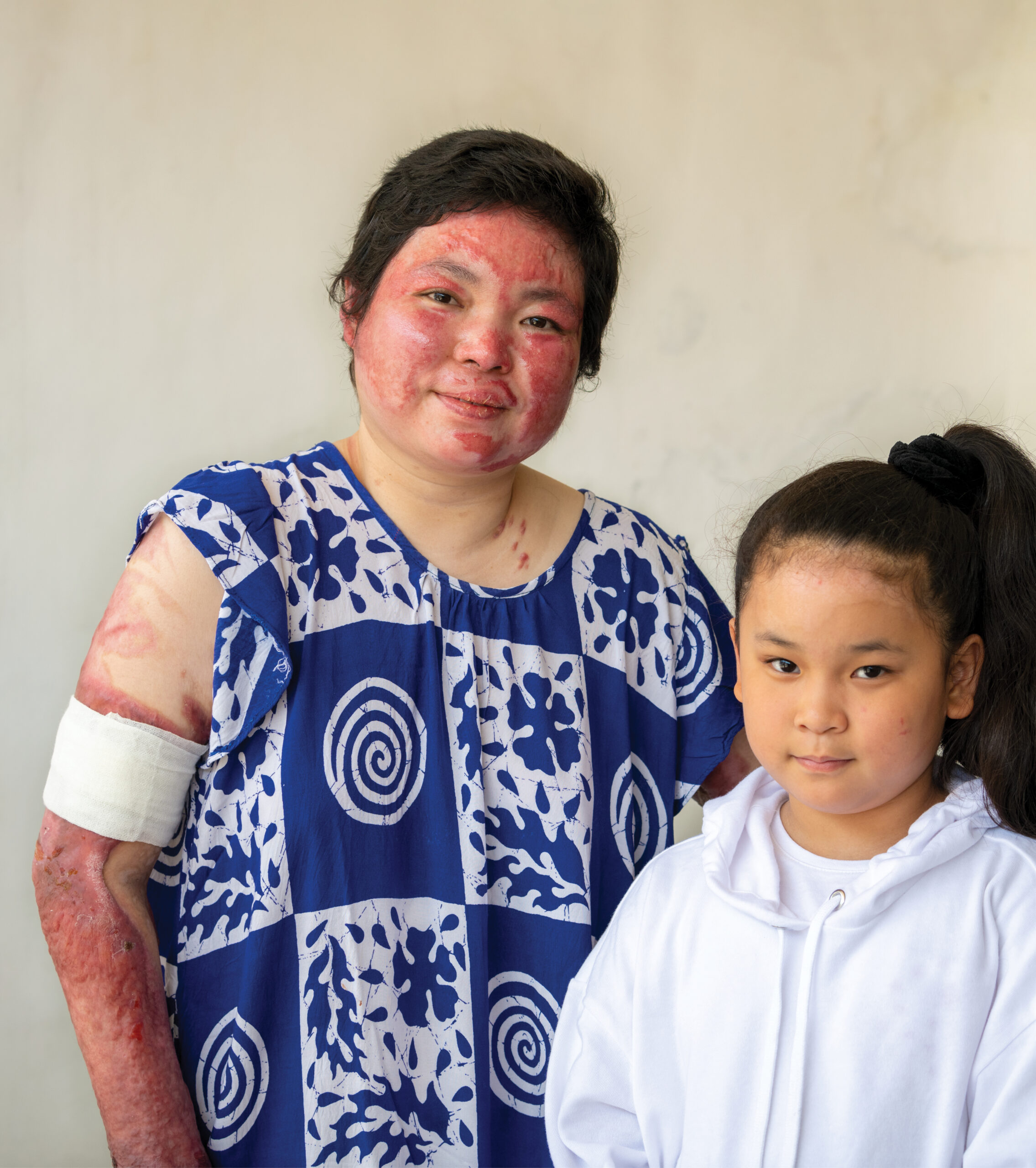
The Day of the Bombings
More than a year after suicide bombers killed 15 people at three Indonesian churches, the survivors continue to heal from their injuries and question why they were attacked — even as they hold fast to their faith in Jesus Christ.
Before sunrise on May 13, 2018, Wenny Hudojo hurried to get herself, her two sons and her niece dressed and ready for the second service at Saint Mary Immaculate Catholic Church in Surabaya, East Java, Indonesia.
She and the children then made their way through the busy streets of the second largest city in Indonesia to gather for worship, as they did every Sunday. “It was a typical morning,” Wenny recalled. “We went to church every Sunday, but my husband wasn’t able to come with us this time because he was sick.”

As they walked through the church gate, her sons, 8-year-old Nathan and 11-year-old Evan, talked excitedly with their 11-year-old cousin, Evelyn, about the games they would play after church. After passing the church security guard on their left, Wenny heard a motorcycle zip past them on the right. She turned to see two young men on the bike heading straight for the church building … and she braced for the worst.
6:30 a.m.
The two young men, ages 16 and 18, detonated their explosives about 12 feet away from Wenny and the children, immediately killing a woman, a child and a security guard. “I didn’t hear the sound of an explosion,” Wenny said. “It was like my ears weren’t there, and then slowly I could hear a very low sound. I saw this bright light and there was a force that pushed me down on the ground. In my heart, I prayed, ‘God, help me find my kids.’”
Wenny held her bloody hands in the air to make sure they were still there. Then, amid the screams, smoke and chaos, she began searching for her younger son, Nathan. She could hear his cries of agony but couldn’t see him. “I thought, ‘If he can cry that means he will be OK,’” she recalled. “At that moment, I didn’t hear any other sound. I just felt the crying of my son.”
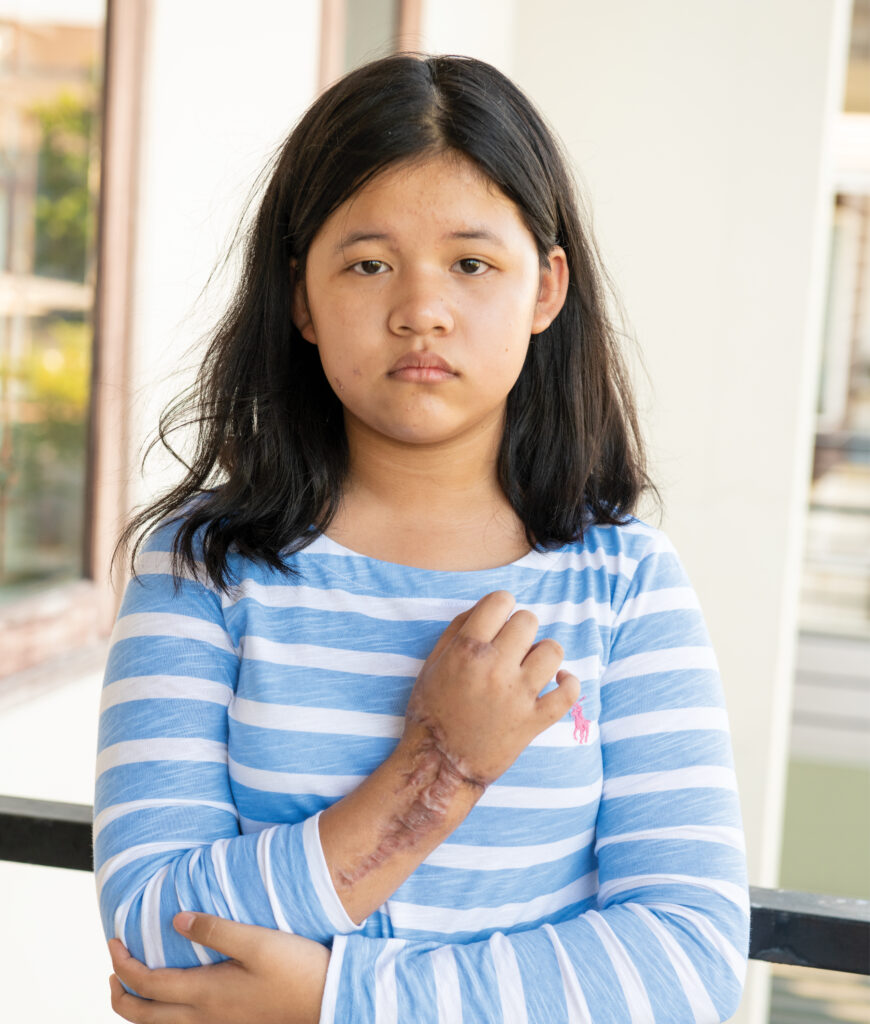
Running toward his cries, Wenny found Nathan lying on the ground near Evelyn, who also remained conscious. She yelled Evan’s name but received no reply, and then she saw his lifeless body a few feet away. Unaware of her own injuries, she tried to pick up her boys but her right ankle collapsed. Then she noticed blood dripping from Evan’s mouth as she struggled to lift his limp body. “At that moment, I felt he had left me,” she said solemnly.
Wenny pleaded for help from the panicked crowd fleeing the site of the explosion, and a man came to her aid, along with a security guard he had summoned for help. After the two men carried the boys to the man’s car, he rushed them to the hospital. Wenny, unable to walk, collapsed in front of the church gate before another church member drove her to the hospital.
Three miles west of Saint Mary Immaculate, a woman and her two daughters, ages 9 and 12, climbed out of a black minivan with tinted windows in front of a Protestant church. All three were wearing tan niqabs, veils worn by some Muslim women that reveal only their eyes.
7:15 a.m.
Watching the woman and two girls in tan veils walk calmly toward the Indonesia Christian Church, a security guard sensed something was not right. As he yelled at them and rushed to stop them from entering the building, the woman, who was holding a conspicuous bag, hastened her pace toward the church. Then she detonated the bombs, killing herself and her two daughters.
The bombs weren’t powerful enough to kill anyone nearby, and even the security guard, who was just inches from the explosion, survived the blast.
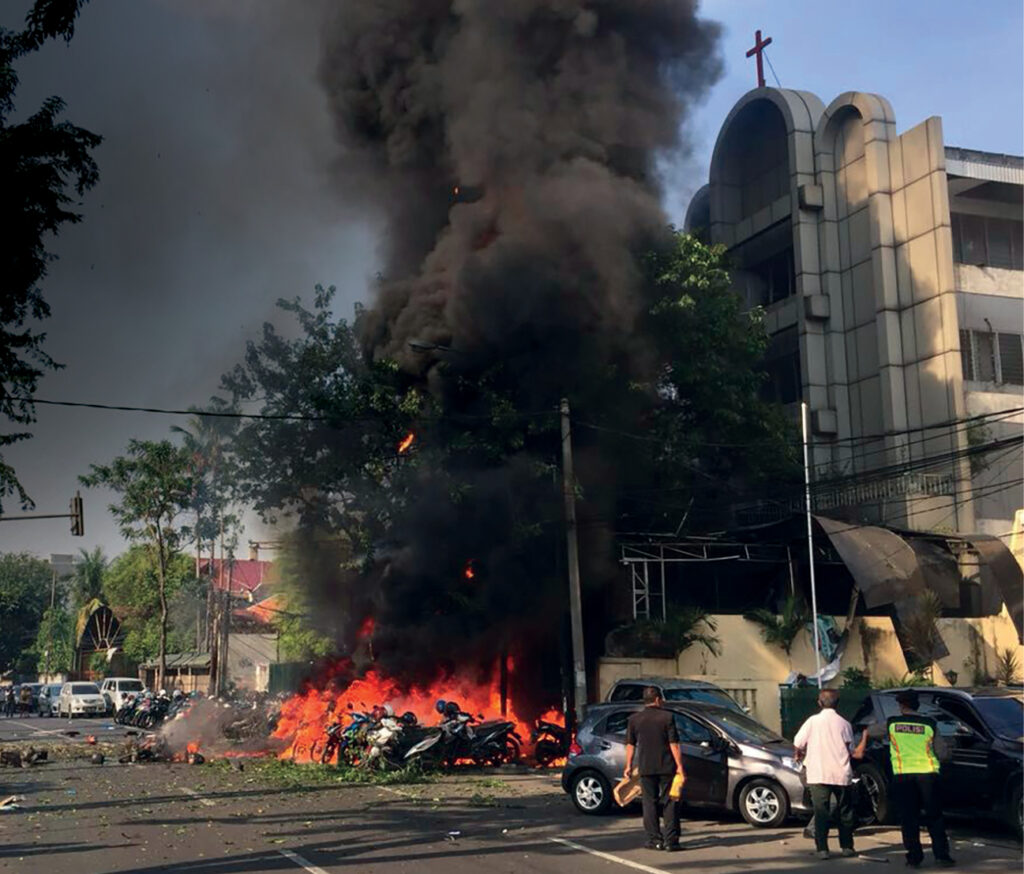
Shortly after the woman and two girls killed themselves in front of the Indonesia Christian Church, the black minivan that had dropped them off approached another church, located two miles northwest.
7:53 a.m.
Fenny Suryawati was standing at the bottom of a staircase near the main entrance to the Surabaya Central Pentecostal Church when the black minivan rammed the church’s gate, striking two parking attendants. Five bombs inside the vehicle erupted into a ball of fire, igniting the gas tanks of five cars and 30 motorcycles parked nearby.
The initial blast killed two people, and the ensuing flames quickly enveloped the front of the church building … along with Fenny, who was on her way to pick up her 8-year-old daughter, Clarissa, from Sunday school. She estimated that she was about 10 feet away from the minivan when it exploded.
“I felt heat all over my body,” Fenny said haltingly as she recounted the horror of the blast. “I was asking the people for help.” The flames scorched 85 percent of Fenny’s body, including most of her face. She said she’ll never forget the feeling of the water flowing down her smoldering skin as other church members tried to quench the flames burning her flesh. “It helped,” she said with a grateful smile. “I felt the cold and also caught some water in my mouth.”
The bombs that struck Surabaya Central Pentecostal killed 10 people, some of whom succumbed to their injuries later, and injured several more. According to the Indonesian National Police, they were of a type known as “Mother of Satan,” the explosives of choice for the self-proclaimed Islamic State (ISIS).
While the third bombing was the most powerful and destructive of those carried out that morning, the carnage could have been much worse. A bomb disposal unit later discovered and defused two additional explosives near the church.
As flames consumed the church entrance, Pastor Yonathan Biantoro Wahono led 1,300 worshipers inside the building toward the back door. “I heard a big explosion, but I thought the fire was electrical,” he said. “I saw the fire coming inside, but I could not see anything because of the black smoke.” After police told Pastor Yonathan that the church had been attacked and people had been injured, he helped organize transportation to area hospitals for those still waiting for an ambulance.
Fenny was moved to an evacuation area, where she was reunited with her daughter, Clarissa, her husband, Erry, and her mother-in-law. At the time of the blast, Erry was inside the church and Clarissa was standing near the top of the stairs, on the second floor. She suffered burns to her forehead, stomach and hands, and her mouth was bleeding from a shrapnel wound.
“I was not near the fire, but when I was walking it hurt so bad,” Clarissa said. “I felt the heat on my skin. I didn’t have water, so I was just running and my grandma splashed water on my face. I was feeling so scared and so worried about my mom.” Fenny broke down in tears when she saw Clarissa’s injuries.
A church member helped Fenny and Clarissa into the back of his car and sped toward the hospital, not knowing whether Fenny would survive.
Fighting to Live
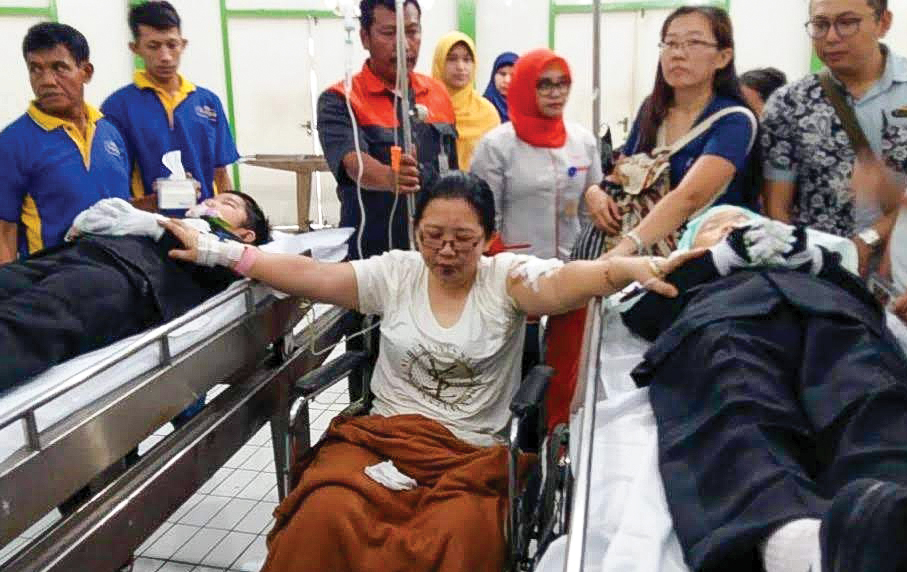
In the immediate aftermath of the bombing at Saint Mary Immaculate, the only pain Wenny had noticed was near her right ankle, where shrapnel had sliced through a tendon. But hospital staff later discovered that she had several additional injuries, including broken ribs and deep cuts on her face.
“I tried to endure the pain when I was at the church because my kids were the priority,” she said. The emotional pain and anguish she felt for them was far worse than her own physical pain; all she wanted was to hold her sons. Although Evan was already dead, she longed to see his body. Once inside the hospital, Wenny saw Nathan lying two beds away with his legs propped up, but hospital staff soon closed a curtain around him.
While waiting in the operating room for emergency surgery to remove shrapnel from her ankle, Wenny overheard a nurse say the boy in the next room needed a leg amputation to save his life. Shrapnel had ruptured the femoral artery in Nathan’s leg, causing heavy bleeding. “As anesthesia flowed into my blood, they gave me time to pray,” Wenny said tearfully. “I prayed that God would give the best for my son because I could not do anything.”
Wenny regained consciousness several hours later, following a successful surgery, and told her family members to go stay with Nathan. She could rest by herself, she told them, but he shouldn’t be left alone.
The next day, doctors told Wenny that Nathan had died. His body had shut down after extensive blood loss. “Nathan liked to run,” Wenny said. “Maybe when he realized that he would lose his leg, he lost his hope. Nathan always told Evan he would go anywhere his brother goes.”
During Fenny’s 20-minute ride to the hospital, her senses and emotions caught up with her physical condition.
“I did not feel heat anymore but I smelled burning flesh,” she remembered. “At the moment, I just thought about my daughter and what had happened to her … why her body was [injured] like that.”
At the hospital, doctors placed Fenny in a tub of warm water to stop the burning and stitched up the open wounds above her eyes and on her upper lip. They then took her to surgery to remove shrapnel embedded in various parts of her body. “One piece of steel pierced my left side,” she said, pointing to the spot. “Thank God it did not hit my lungs.”
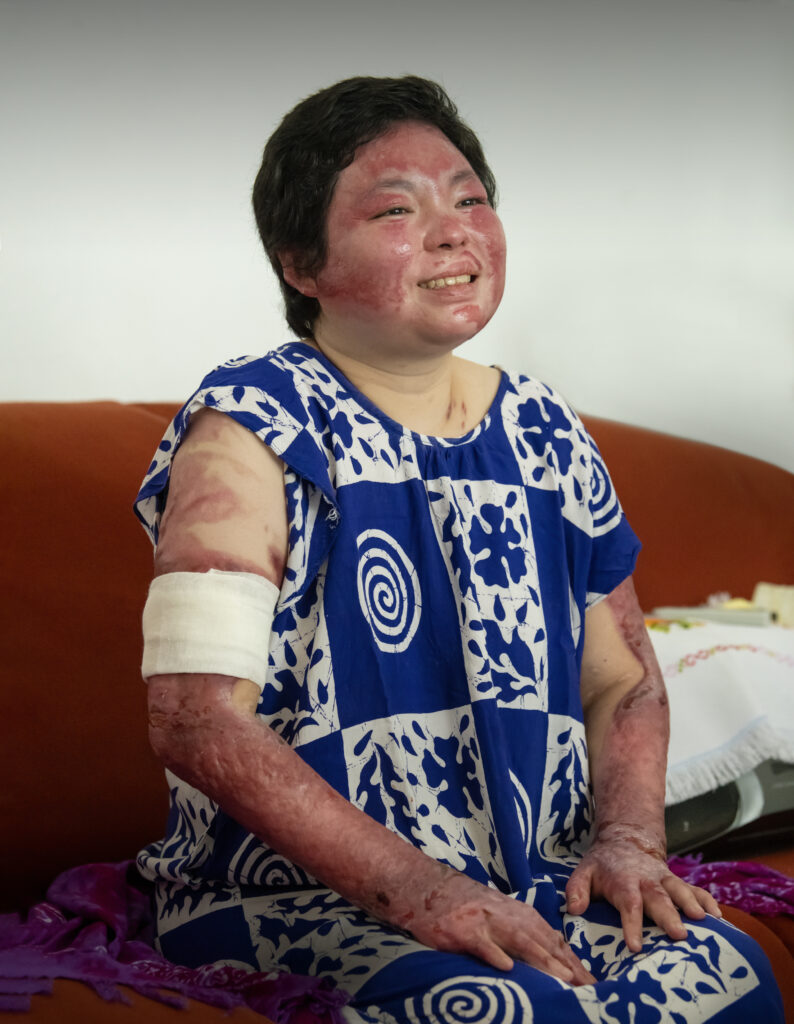
Surabaya, East Java, Indonesia.
Doctors spent hours dressing her burns. “At that moment I started to feel the heat again,” she said. “The pain came back, too.”
Over time, Fenny’s skin hardened. Every four days, she was given anesthesia so a doctor could slowly peel away the dead skin. She underwent that procedure 21 times; doctors could not perform skin grafts because she didn’t have enough healthy skin left. During Fenny’s three months in the hospital, Pastor Yonathan and members of her church visited her in the intensive care unit regularly to encourage and pray for her.
Fenny was crushed when she realized she wouldn’t be able to return to work as an administrator for a construction company. “I had been working there since 2008,” she said. “After the bomb, I also had depression because I thought with my condition I could not do anything.”
After her release from the hospital, Fenny received physical therapy twice a week for several months to regain strength in her hands. Her healing has progressed slowly and painfully. “Persecution is uncomfortable, but what can I do?” she said. “Now I must go on with what has happened.”
Growing Stronger
Today, Fenny’s mobility remains limited by the tenderness of her cracked, purplish skin. The tops of her feet are scarred with the pattern of the sandals she was wearing the morning of the bombing, a constant reminder of that horrible day and everything it cost her.
Fenny said she has learned to love the scarred face that stares back at her from the mirror, but it has taken time. She admits it was difficult to overcome the initial shock and shame of her disfigurement. She still works to overcome the fear and anxiety that confront her every time she leaves her home, but she said she has chosen to forgive those responsible for her current condition. “I am not a woman who keeps the anger,” she said softly but confidently. “I am a woman who likes to surrender all to God and let Him arrange all for me.”
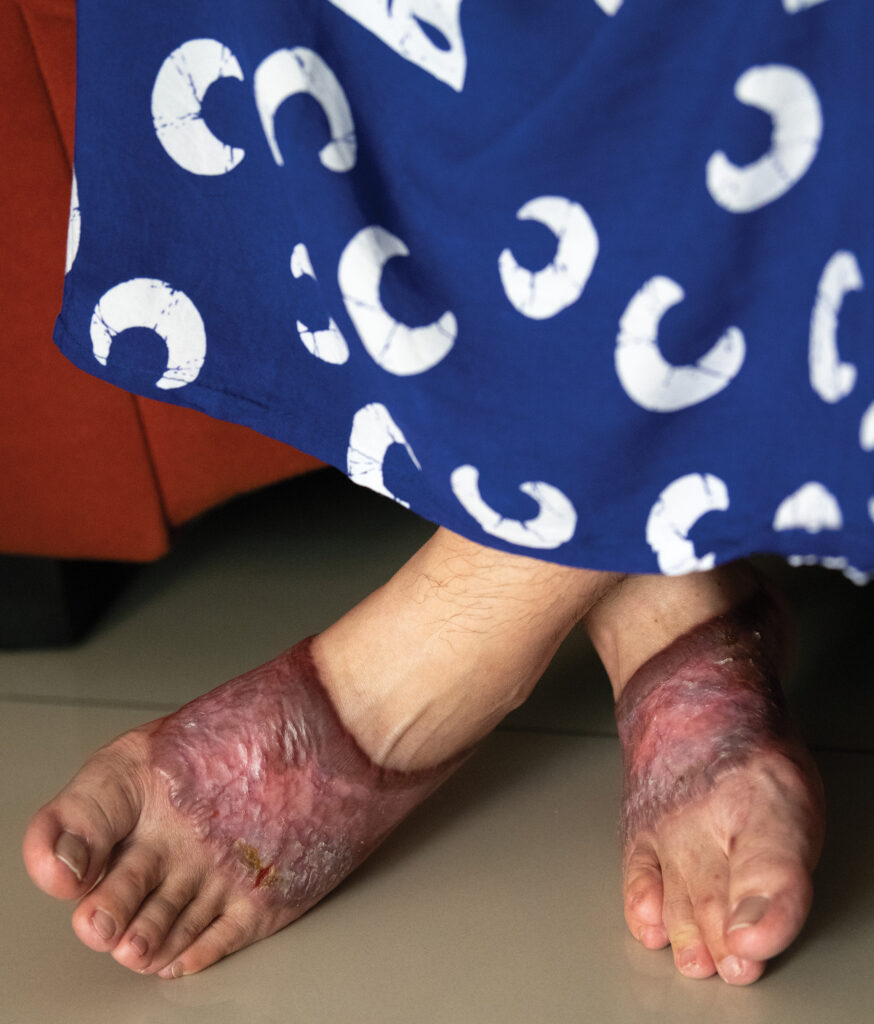
Fenny has surrendered more than the events of May 13, 2018. She has had to relinquish control in every aspect of her life. She relies on others, mainly her husband, Erry, to help her get through each day. She requires help bathing and dressing each day, and she is resigned to wearing loose-fitting gowns that don’t cling to her fragile skin.
The most difficult part of her new life, Fenny said, is the necessity of avoiding physical contact. Clarissa’s hugs are now too much to bear. “It’s … so … sad,” she said, emphasizing each word with a nod of her head as her eyes filled with tears.
Clarissa, now in middle school, is nearly pain free. She wants to be a doctor when she grows up so she can help the suffering, like her mother whom she prays for daily.
Wenny still takes pain medication every day. She also receives physical therapy three times a week to restore strength and mobility to her right leg, right hand, right arm and shoulders. “Sometimes my fingers move uncontrollably,” she said, raising her right hand.
Through prayer, she works to overcome the worst pain of all — losing her two sons. “When they were still alive and I had problems, my heart was comforted by the sound of them playing and the sound of their voice,” she said. “But now that is gone.”
Wenny said her husband struggles to overcome the guilt he feels for not being there when his sons died, even though it could have cost him his own life. “It is different for me because I only cry when I miss them,” Wenny said, “but my husband is always crying.”
A week after Nathan died, Wenny spoke with her pastors about how to truly forgive those who had taken her sons. She has found healing in sharing her story and said talking about it helps her make sense of it. “Some churches and groups invite me to share my testimony with them,” she said smiling, “and I am happy to do that to be a blessing.”
Wenny remembers Evan as a quiet boy who showed his love for others through his actions. Nathan, who was more outgoing, was a cheerful boy who was always ready to stand up for his many friends. The boys loved to shoot their Nerf guns and play games with their cousin, Evelyn.
Evelyn, now a teenager, has lived with Wenny and Erry since she was 6. She suffered a broken right wrist in the bombing as well as severed nerves in three fingers on her right hand. As a result of her injuries, she has had to learn how to write with her left hand. She has also undergone three surgeries to remove shrapnel from her legs and feet.
“Both feet still have shrapnel, and so does her thigh,” Wenny said as Evelyn sat quietly nearby. “The doctor is thinking twice about taking shrapnel from her thigh because it could leave her paralyzed.”
Evelyn becomes more talkative and confident when she shares memories of playing with her cousins. But when she does, she has to try hard not to cry. “I miss them,” she said, wiping away tears.
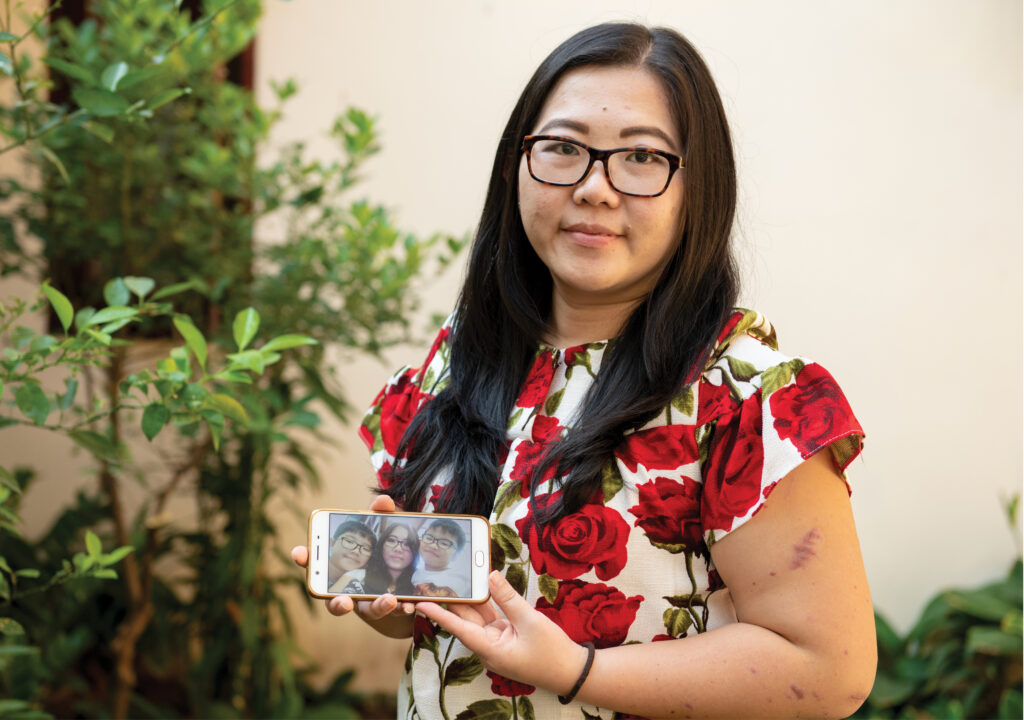
Remaining Faithful
Days after the attack, small-group leaders at Surabaya Central Pentecostal Church contacted their group members and told them to spread the word: The church will gather on Sunday. “I wanted to encourage the congregation to not leave because this happened,” Pastor Yonathan said. “We also wanted to show that we love God, and when we love God, the less afraid we are of persecution happening in our life. We must still love God.”
Local police and members of Indonesia’s military guarded churches throughout Surabaya on the Sunday following the attacks so Christians could worship without fear. At Surabaya Central Pentecostal, police also blocked roads surrounding the church for added protection. Staff and volunteers set up large tents in the church’s parking lots, and more than 1,000 people attended the church’s two services at 6 a.m. and 3 p.m.
Although attendance that first Sunday following the bombing was a fraction of the 5,000 who normally attend the church’s four Sunday services, the community was inspired by the believers’ courage and faithfulness. Pastor Yonathan said many of the church’s Muslim neighbors stood outside their homes to witness the Christians worshiping the God of the Bible.
“Our Muslim neighbors said, ‘When Christians get a problem like this, they are not afraid; they are still faithful to God,’” Pastor Yonathan said. “One of the men who takes care of our parking said, ‘I’m surprised by the church. After they are bombed, the church is stronger.’
“God is still good!” Pastor Yonathan said, smiling. “Maybe we don’t understand, but I am sure that God is still good, and that is important. His will is perfect for us. Don’t get angry toward God; God is still good.”
The pastor’s first message after the bombings focused on Romans 8:28 — “And we know that for those who love God all things work together for good, for those who are called according to his purpose.” He also stressed the importance of unity, faithfulness and forgiveness in the face of persecution.
“We must pray for each other,” he said. “We must remain unified and we must encourage others. The main point is that we forgive the people who did what happened. We pray for others like them, that God can give them grace to repent.”
Pastor Yonathan requested prayer for the healing of his church, especially for those who experienced trauma. He also asked us to pray that his congregation will continue to be used for God’s glory.
The parts of the church building damaged in the blast have been repaired, and a larger, stronger security gate and new protective barrier have been installed at the building’s entrance. The church continues to gather for worship and love Muslims in its neighborhood, and Pastor Yonathan said he doesn’t fear another attack.
“The Great Commission is our task,” he said. “We must share the gospel to other people so they can be saved, too.”
Asking “Why?”
According to the Indonesian National Police, the May 13, 2018, suicide bombings marked the first terrorist attacks in Indonesia’s history carried out by an entire family — including children. They were members of Jamaah Ansharut Daulah (JAD), a local branch of ISIS that in 2016 had bombed a church in Samarinda, Indonesia.
Authorities said the parents in this family, who had recently returned from Syria, were among the hundreds of other Indonesians who traveled to Iraq or Syria in 2017 to join ISIS. Indonesia’s National Agency for Combating Terrorism had added their names to a federal terror watch list, but the family’s preparations for the attacks had gone undetected.
The deaths at the three churches weren’t the only ones caused by the JAD that day. At 9 p.m., three members of a Muslim family of six were killed when a bomb detonated prematurely in their apartment. They had reportedly planned to attack additional churches. And the following morning, another bomb exploded at Surabaya Police headquarters, injuring four police officers and killing four members of a Muslim family of five. The surviving family member was an 8-year-old girl.
In all, 28 people (including 13 suicide bombers) died and 57 more were injured in the sophisticated attacks, making them Indonesia’s most deadly since the 2002 bombings in Bali. Authorities said ISIS ordered the 2018 attacks as revenge for the imprisonment of JAD’s leader, who was prosecuted for his role in attacks carried out in Jakarta two years earlier.
While authorities have discovered the apparent motives for the attacks, the bombing victims continue to ask, “Why us?” Pastor Yonathan struggles to understand why his church was targeted when they have intentionally worked to show their love for the neighboring Muslim community. Church members give food to impoverished Muslims following Ramadan, and the church also operates a medical clinic where patients, including Muslims, receive care for a small fee or even at no charge.
“I didn’t have any anger,” Pastor Yonathan said, “but in my heart I have a question: What did we do wrong to them? We do good things to them, so why did they attack us?” On a deeper level, the pastor knows persecution is part of following Christ. And from that perspective, he knows they must be doing something right. “Spiritually, this may be our next step,” he said. “I told the church, ‘God can use your life in a new way now.’”
The Voice of the Martyrs continues to help pay medical expenses for Wenny and Fenny as well as for others affected by the bombings.
After losing her two sons, Wenny said she has struggled to regain her sense of purpose, and she still carries a lot of emotional pain. “When I see the photos of my sons, I always ask in my heart, ‘Why did this happen to my sons?’” she said. “The time has gone by too fast for me. It is like one day I gave birth to them and the next day I lost them.
“Why is still a big question for me,” she continued. “Even though some people told me it is part of God’s plan for me, I am still searching for the answer to the ‘Why.’ By accepting invitations from the churches to share my story, I hope I can get the answer to this.”
During her own healing process, Fenny said she has moved from asking “Why me?” to asking “Why am I still alive?” One physician told her he had never treated someone who survived burns as severe as hers.
Today, Fenny is finding the courage to step out in public more often. When she senses people staring at her scars, she quietly asks God a new question: “How can I be used in this situation?” When people ask about her burns, she eagerly tells them about Christ. She wants Him to use her story and her pain for the advancement of His kingdom.
“The first question I had in my heart has disappeared because some people have come to me and said that I will be a blessing,” Fenny said, smiling confidently. “It is God’s plan for me.”


 Guide
Guide